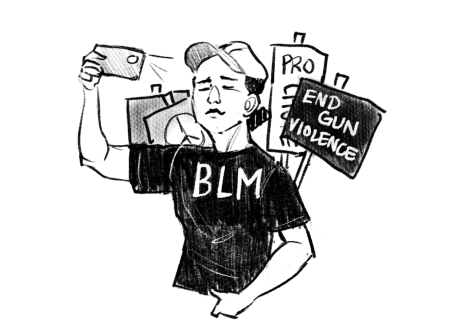Cross-Fire: Stay in or walk out?
October 5, 2022
Performative activism- Natalie Comerford
A flier plastered on campus for the Oct. 4 abortion rights walk-out reads: “STUDENTS HAVE THE RIGHT TO PROTEST. DO NOT LET YOUR VOICE BE SILENT.” Students do have the right to protest, but who are we protesting, and why are we walking out of class for it?
Your fellow students, professors, Whitman College itself and Washington State are not restricting your right to abortion. If you live in Washington (which, we do), you can get one any time you please. Appointments are available a short walk from campus at the Walla Walla Women’s Clinic or the Walla Walla Planned Parenthood. Abortion rights are vital, and Roe v. Wade being overturned was devastating to many people’s right to choose – luckily for us though, Washington State will be fine.
Walk-outs are an important way to protest. I still remember the massive walk-outs after the Parkland shooting in 2018, and that felt good and important to be a part of. Unlike protesting school shootings by walking out of high school though, Whitman doesn’t need to be protested against; they aren’t the problem. I was in a 300-level gender studies class during the walk-out; how does leaving class help the abortion movement more than actually learning the material?

The posters state “we won’t be silent”, but who is silencing us… Whitman? I guarantee you the College supports our right to choose. Unlike high school that is (relatively) required, we are now adults paying to be in these classes; no one is forcing us to go to class. Protesting the overturning of Roe v. Wade by walking out of a voluntary gender studies seminar (or really any other class that we pay to attend) is extraordinarily performative, and I don’t see how it could actually have an impact on abortion rights.
These boots were made for marching- Bex Heimbrock
Walk-outs are one of the only ways for students to protest effectively. Instead of kvetching about theoretical problematics, we should actively participate in forms of protest that insist upon the discomfort of institutions.
I was fourteen years old when I organized my first walk-out. I and other high school students left class in response to the Marjorie Stoneman Douglas High School shooting – one of the deadliest school shootings in U.S. history. Though the particulars of the situation have changed, the revolutionary act – and what it means – has not.
Then, just as now, we were pushed to action by a dire circumstance.
Then, just as now, we were functionally powerless.
The only power that we possessed could be found in the simple fact of our being and our autonomy.
Walk-outs are moments where participants are invited to reassert their autonomy. Taking control over the physical actions of one’s body (i.e. standing up, walking out and gathering on the quad) is a truly revolutionary act. Onlookers and those in power are forcibly reminded of that fundamental truth: we fight back.
This is not a question of raising awareness – we can safely assume that everyone moved to walk out has ample knowledge of the situation at hand. Rather, this is a question of force – and the power behind a show of autonomous force.
Overturning Roe v. Wade has reminded us that if Christo-fascists have their way, our bodies are not our own.
To rebel against this gross overreach of judicial authority is to reclaim ownership of one’s body – it is to walk out. Any other form of protest, any attempt at hierarchy or – God forbid – liberal ‘teach-ins’ (think like the rest of us!) would fail.
Take control; walk out.




Natalie Rodgers • Oct 5, 2022 at 9:55 am
Maybe start by boycotting Starbucks for their union-busting campaign.